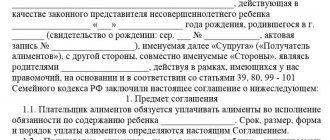Divorce through the court is carried out in two cases: if there are minor children or one of the spouses avoids divorce. Depending on your requirements, the presence or absence of children, documents should be submitted to different authorities, and in some cases you are even given a choice. The determination of the specific court that will hear the case is called jurisdiction.
First, you should understand on whose territory, the husband or wife, the trials will take place.
Secondly, which court will hear the case: world or district.
This article will help you correctly determine jurisdiction and avoid mistakes when filing a claim.
Situation 1. Jurisdiction in case of divorce without children
It often happens that the spouses mutually came to a decision on divorce, but if there are children, the law provides only for a judicial procedure for divorce, so one person will have to file a lawsuit in court. A similar case occurs if there are no children, but one of the parties refuses to get a divorce through the registry office.
Solution:
We determine jurisdiction as follows: we file a claim for divorce in the magistrate's court, a month later the first court hearing will be scheduled, at which the judge will dissolve the marriage or provide a period for reconciliation within 3 months. The court decision comes into force one month from the date of its adoption.
If there are children: divorce with children.
Jurisdiction for a claim for divorce in the presence of children is determined by who the minors live with. If the initiator of the divorce is the wife and she is raising children, then she has the right to choose the branch of the court.
In a situation where minors live with the husband, the claim is considered at his place of residence.
If there are special circumstances, the application may be submitted to different authorities:
- when filing a divorce from a foreign citizen, the second spouse applies at his place of residence;
- if the husband’s place of residence is unknown, then the wife can apply to his last place of residence;
- in the case where the spouse is arrested, the application is sent to the place where he was registered before being sent to prison.
Situation 2. Divorce and collection of alimony - jurisdiction.
The decision of the spouses to divorce affects not only their interests, but also the interests of minor children, who, as a rule, remain to live with one of the parents. But this does not diminish the parental rights and responsibilities of the other. Alimony is not your money, but the child’s money, paid by the ex-spouse in order to maintain the previous standard of living and provide for the minor. Therefore, when ending a marriage relationship, you should not forget about the material component and the interests of children who are not yet capable of making decisions.
You can collect alimony both after the divorce and during the marital relationship, there is no difference. Women also have the opportunity to demand alimony for their maintenance until the child reaches 3 years of age, and in case of debt formation, apply for a penalty, 0.5% of the amount of debt for each day of delay in payment. Alimony is collected from the date the claim is filed in court.
This case is also useful for alimony payers; in connection with the birth of a new child, changing the amount of alimony obligations for existing children is made only through the court.
Solution:
The collection of alimony falls under the jurisdiction of magistrates, therefore we file a claim for divorce and collection of alimony in the magistrate's court. You can list all your claims in one statement of claim or file two claims. In the first case, the collection of alimony may be delayed; the court has the right to provide a period for reconciliation of the spouses within 3 months. If alimony is collected separately, the period for consideration of the case is 1 month.
The court decision to collect alimony is subject to immediate execution.
If the defendant does not pay other alimony, is officially employed, and has a regular income, the simplified procedure is applied. You should not file a statement of claim, but rather an application for a court order to collect alimony as a percentage of wages (¼ for one child, ⅓ for two children, ½ for three or more), which the judge will consider within 5 days and without calling the parties will issue a writ of execution. However, the spouse, who does not agree with this, has the right to cancel the court order within 10 days after its receipt. If this happens, you should already file a claim for alimony.
Lawyer's answers to frequently asked questions
Where can I apply for divorce if I don’t know my spouse’s current place of residence?
The provisions of the Civil Procedure Code of Russia establish that a claim will be considered in the region of residence of the plaintiff if the applicant does not know the defendant’s residential address. It is important to consider the following factors:
- lack of information about place of residence;
- there is no information about the registration address;
- There is no defendant at his last known address.
The petition must indicate the period during which the participants did not maintain a relationship. It should be noted that when checking the last registration address, the defendant no longer lives. It is better to additionally support the explanations of witnesses who confirm the absence of the citizen at the established address.
Which court should I file for divorce if my spouse is in prison?
Deprivation of liberty of a spouse does not exclude the right to unilateral divorce. In this case, the plaintiff must send the appeal to his personal residential address. This is due to the fact that the convicted person will still not be able to be present during the trial. But it is imperative to send the defendant notice of the upcoming divorce.
If the term of imprisonment exceeds 3 years, then the second partner has the right to initiate a divorce through the civil registry office. This can be done regardless of the presence of common minor children. Moreover, imprisonment for a period of 3 years or more gives the right to deprive a parent of paternity/maternity.
Situation 3. Jurisdiction for divorce and division of joint property of spouses
At the time of divorce, the parties often have mutual claims regarding property that was acquired during the marriage, as well as pre-marital property. If one of the spouses financially provides for the family, this does not mean that the money he earns is his personal property, it is now the family’s money. Many people wonder what to do with property that was purchased during marriage using common funds, but is registered in the name of one of the spouses? Regardless of who is the owner of such property according to the documents, it is considered jointly acquired by the spouses for another 3 years after the divorce. Consequently, division can be carried out during the marriage relationship and before the expiration of 3 years after its termination. It is important to remember that if the property was not officially divided within the established time frame, the owner will remain the one who was previously indicated in the registration documents. Whatever the relationship between the parties, the division of property should not be delayed.
Solution 1.
Filing one statement of claim for divorce and division of joint property of the spouses to the district court, which has jurisdiction over disputes regarding the division of property, the value of which is over 50,000 rubles. If there is no rush to obtain a divorce certificate and affix a stamp in your passport, this option is more convenient. But do not forget that the division of property may drag on for many months, and until the judge makes a decision, the marriage will not be dissolved.
Solution 2.
Divorce through magistrates or civil registry offices and filing a claim for the division of jointly acquired property in the district court. If real estate is subject to division and no other requirements are stated, jurisdiction is determined by one of the real estate objects. Divorce will be faster, however, you will have to visit several institutions.
In what cases is divorce possible only in court?
In accordance with the articles of the Family Code of the Russian Federation and Resolution of the Plenum of the Supreme Court of the Russian Federation No. 15 of 1998, divorce is carried out in court in the presence of the following circumstances:
- one-sided desire to end the marriage;
- mutual desire to get a divorce, but the second participant avoids visiting the civil registry office;
- presence of common minor children;
- desire to carry out a parallel division of joint property.
Exception:
- unilateral termination of marriage with an incapacitated spouse;
- unilateral divorce from a convicted person (punishment of at least 3 years in prison);
- divorce from a person declared missing;
- the absent spouse sends an application to the registry office with a request to carry out the procedure without his presence;
- in relation to one of the partners, a decision was made to annul the judicial adoption;
- deprivation/cancellation/denial of paternity;
- The husband and wife decided to divide the property later (after the divorce was finalized).
Situation 4. Divorce in the presence of minor children and a dispute about children, how to determine jurisdiction
The situation is similar to the previous one, the only difference is that the statute of limitations is different here.
Disputes about raising children can be resolved during the marriage and before the child reaches 18 years of age. If there are any disagreements about who the children will live with or what order of communication the separate parent will have with them, it is necessary to contact the district court, which will clearly establish: with whom each child will stay and at what hours, days, holidays the other parent can communicate with him . Such cases are lengthy in nature, the guardianship authorities at the place of registration of the mother and father are involved to give an opinion on the case, and a forensic examination may be carried out to establish facts that are important for resolving the dispute. The opinions and affection of children towards their parents, brothers and sisters are taken into account. Therefore, if it was not possible to peacefully resolve the conflict, we must try to go through the courts with the least possible losses. Solution 1.
Submitting a statement of claim to the district court listing all the requirements: for divorce, determination of place of residence and (or) order of communication with the child. A similar rule for determining jurisdiction applies to other disputes about children. You can also include the collection of alimony in the claim; the district court will consider it along with the above.
Solution 2.
Divorce through a magistrate's court and filing a claim regarding disputes about children in a district court. Applications can be submitted simultaneously or in different periods of time, the jurisdiction will not change. During the hearing, the parties may also reach a settlement agreement.
The concept of territorial jurisdiction
Territorial jurisdiction may be:
- basic . Based on Art. 28 of the Code of Civil Procedure of the Russian Federation, the plaintiff brings a claim at the place of residence of the defendant;
- alternative . The plaintiff can choose from several judicial authorities (Article 29 of the Code of Civil Procedure);
- negotiable _ Jurisdiction can be changed by agreement of the spouses (Article 32 of the Code of Civil Procedure). The document must be in writing and presented along with the claim;
- jurisdiction over connection of cases . Applies to claims filed for joint consideration with a demand for divorce (Article 31 of the Code of Civil Procedure).
Dear readers! To solve your problem right now, get a free consultation
— contact the on-duty lawyer in the online chat on the right or call:
+7
— Moscow and region.
+7
— St. Petersburg and region.
8
- Other regions of the Russian Federation
You will not need to waste your time and nerves
- an experienced lawyer will take care of solving all your problems!
Results
In order to divorce your spouse, you need to decide on two types of jurisdiction: vertical and horizontal. The first involves choosing between the magistrates' court and the district court.
In cases of divorce and collection of alimony, jurisdiction belongs to the magistrate. If, as a result of a divorce, it is necessary to divide acquired property or resolve disputes regarding children, you need to contact the district court.
The second type of jurisdiction means choosing a locality or area within one city in which to file a claim. As a general rule, divorce cases are under the jurisdiction of the courts at the defendant’s registered address. However, if the plaintiff lives with minor children or cannot leave for health reasons, then the situation changes in the opposite direction.
When to get a divorce in court
The Family Code of the Russian Federation dated December 29, 1995 No. 223-FZ (hereinafter referred to as the FC) defines 2 ways in which spouses or one of them, depending on certain circumstances, can dissolve their union:
- Contact the Civil Registry Office.
- Appeal to the judicial authority with subsequent registration of divorce in the registry office.
Each named option for dissolving a marital relationship is regulated by relevant legislation.
Note! If the divorce is directly through the registry office departments in accordance with Art. 19 of the IC is a fairly quick and simple procedure, the judicial review can take a long time. This is due, among other things, to the fact that the court has the right to take the necessary measures to reconcile the parties, postponing the issuance of the final judicial act for a period of up to 3 months (Article 22 of the Criminal Code).
A divorce is filed through the registry office only in the following cases (exhaustive list).
Important! In case of divorce, when the other spouse is declared missing or incompetent or sentenced to a term of more than 3 years with serving a sentence in prison, the presence or absence of minor children is not of fundamental importance.
Divorce through the court is carried out in all cases when it is impossible to obtain it through the registry office.
For more information on how to divorce, read the material from ConsultantPlus. If you do not yet have access to the ConsultantPlus system, you can obtain it free of charge for 2 days.
Jurisdiction of subject type
A magistrate judge has the right to consider cases of divorce in the following cases:
- challenging or officially recognizing the results of DNA testing;
- determining the place where a child under 18 years of age will grow up after divorce;
- a claim-type request consists of a single demand - to dissolve the marriage;
- restriction, deprivation of the rights to raise the offspring of one of the parents;
- when going to court, the plaintiff, in addition to the desire to dissolve the marriage with the spouse, indicates another requirement directly related to the relationship between the father and mother (for example, the recovery of maintenance);
- a number of other disputes that arise over who young children will stay with after the parents’ marriage ends.
Also, the jurisdiction of the magistrate’s court includes the case when the claim contains, in addition to a request to dissolve the marriage between spouses, also a desire to divide common property. The total value of property that can be divided in half upon divorce in the magistrate's court cannot be more than 50 thousand rubles.








